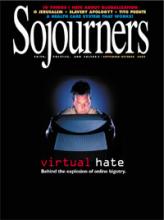I heard it in passing on National Public Radio’s All Things Considered one afternoon; it was a blurb for an upcoming story. The announcer said something about African American pentecostals who played their gospel music on country-and-western steel guitars. They called it "Sacred Steel."
I never heard the report that day, but the image stuck. It was so rich with paradox—even apparent contradiction—that, if you know anything about American music, it seemed inevitable. That’s because the mixing of musical repertoires, traditions, and instruments across racial lines is the story of American musical culture. For instance, there is no instrument more firmly associated with country music than the banjo, but it came directly from West Africa, where it was called a "banjar." We have jazz today because, after the Civil War, freed slaves picked up the brass instruments left behind by military bands.
And the whole business of playing string instruments with a glass or metal slide (the bottleneck guitar of the blues, or the dobro and steel of country) did not, as is often assumed, originate with the Hawaiian music fad of the early 20th century. According to Deep Blues, by the late, great Robert Palmer, it goes back to a West African single-string bow. This in turn survived in rural African American households as the "diddley bow," a string or piece of wire nailed to the wall and played with a slider. (And, yes, that’s the source for Ellis McDaniel’s stage name, "Bo Diddley.")
Read the Full Article
